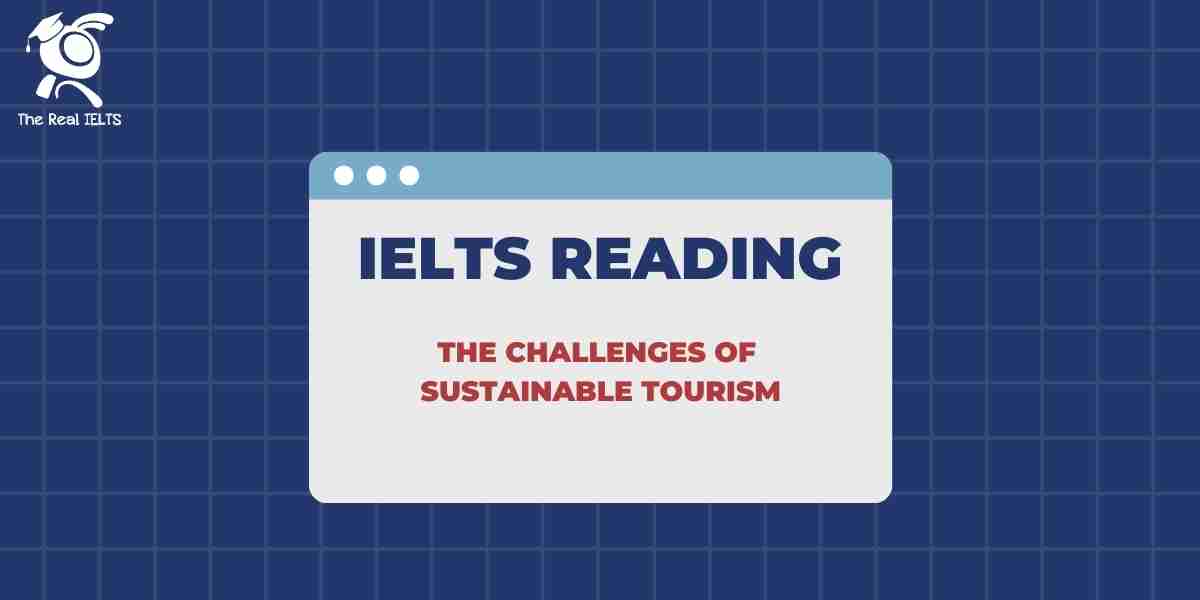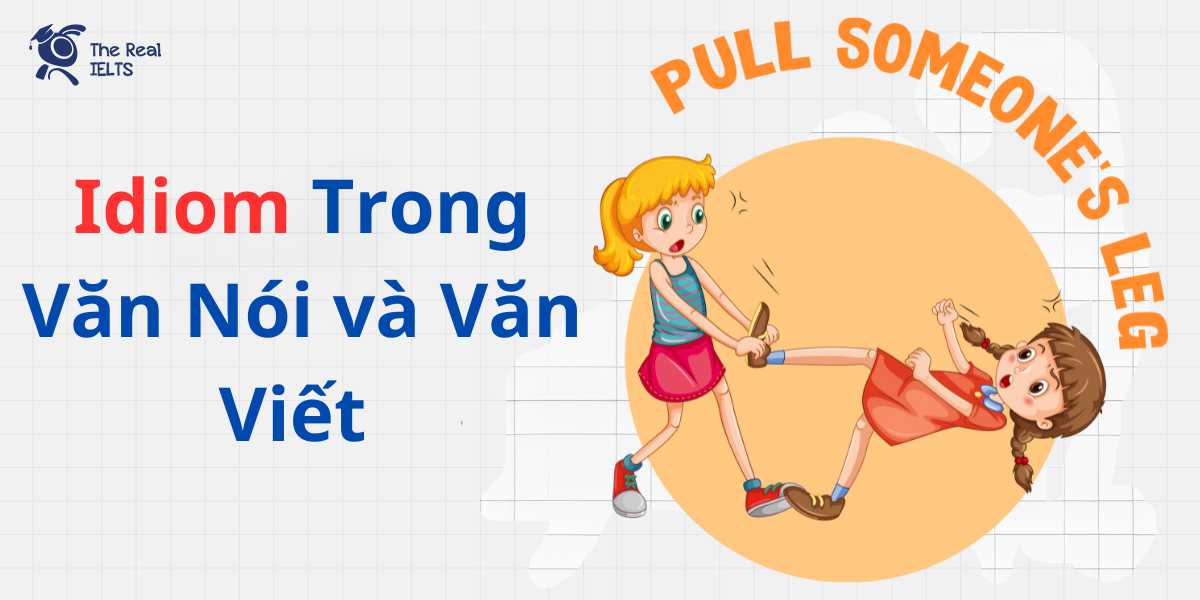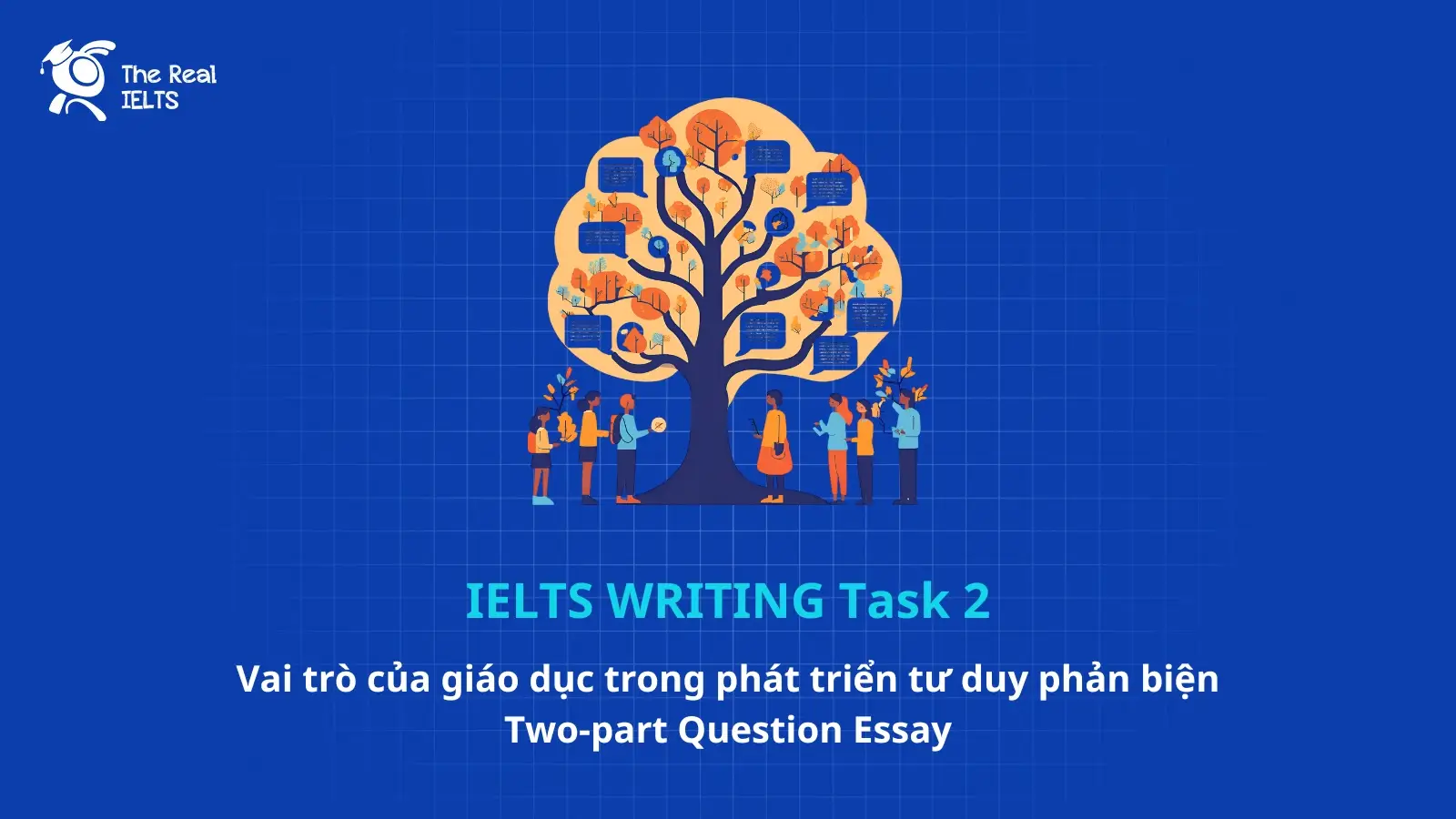Đề thi IELTS Reading có tiêu đề “The Influence of Sports on National Identity”
Nhớ đọc thêm các bài luyện thi IELTS nhé.
IELTS Reading:”The Influence of Sports on National Identity“
The Challenges of Sustainable Tourism
Tourism is one of the world’s largest and fastest-growing industries, contributing significantly to the global economy. However, its rapid expansion has led to a range of environmental, social, and cultural challenges. As more destinations seek to capitalize on the economic benefits of tourism, the need for sustainable practices has become more urgent. Sustainable tourism aims to minimize the negative impacts of tourism while maximizing the benefits for local communities and the environment. Despite its noble goals, the implementation of sustainable tourism faces numerous obstacles. This article explores some of the key challenges to achieving sustainable tourism in today’s world.
1. Environmental Degradation
One of the most pressing challenges of sustainable tourism is environmental degradation. Popular tourist destinations often suffer from over-tourism, where the number of visitors exceeds the environment’s capacity to handle them. Natural habitats are disrupted, wildlife is disturbed, and ecosystems are threatened. For example, coral reefs, which attract millions of tourists annually, are highly vulnerable to human activities such as snorkeling, diving, and boating. In many places, these activities have caused severe coral bleaching and damage to marine life.
Additionally, tourism generates a significant amount of waste, including plastic, food, and water waste, which often ends up polluting natural environments. Coastal areas, in particular, are prone to pollution from hotels, restaurants, and recreational activities. The influx of tourists also puts pressure on local water and energy resources, leading to unsustainable consumption patterns. The challenge lies in balancing the economic benefits of tourism with the need to protect the environment. While some destinations have implemented measures such as waste management programs and eco-friendly accommodations, these efforts are often not enough to counter the damage caused by large numbers of tourists.
2. Cultural and Social Impacts
Tourism can have a profound effect on local cultures and societies, both positive and negative. On one hand, it can promote cultural exchange, preserve heritage sites, and provide income for local communities. On the other hand, it can lead to the commodification of culture, where traditions and rituals are commercialized for the sake of attracting tourists. This can result in the loss of authenticity, as local practices are altered to meet the expectations of visitors.
Furthermore, tourism can contribute to social inequality, as the economic benefits are not always evenly distributed. In many cases, large international corporations control much of the tourism industry, leaving local businesses and workers with a small share of the profits. This disparity can exacerbate existing social tensions and lead to resentment among local populations. Sustainable tourism advocates for fair distribution of wealth and opportunities, but achieving this goal remains a significant challenge.
Another social challenge is the displacement of local communities to make way for tourism infrastructure, such as hotels, resorts, and airports. In some regions, indigenous populations have been forced to leave their ancestral lands to accommodate tourism development. This not only disrupts their way of life but also erodes their cultural identity. Ensuring that tourism development respects the rights and traditions of local communities is essential for sustainable tourism.
3. Economic Dependency and Volatility
While tourism can provide a substantial economic boost to many regions, it also creates a dangerous dependency on a single industry. Many countries, particularly developing ones, rely heavily on tourism as a source of income and employment. This dependence makes them vulnerable to external shocks such as political instability, natural disasters, or global economic downturns, which can lead to sudden declines in tourist numbers.
The COVID-19 pandemic is a stark example of how reliant economies can be devastated when tourism comes to a halt. Countries that depend on international tourism saw their economies shrink, and millions of people employed in the tourism sector lost their jobs. Sustainable tourism advocates for the diversification of economies to reduce reliance on tourism, but achieving this balance is challenging, especially for smaller nations with limited resources.
Moreover, the economic benefits of tourism are often short-term, while the environmental and social costs can be long-lasting. Infrastructure built to support tourism, such as hotels and resorts, can quickly become obsolete if tourism declines, leaving behind vacant buildings and damaged landscapes. Ensuring long-term economic sustainability requires careful planning and investment in industries beyond tourism.
4. Governmental and Policy Challenges
The success of sustainable tourism largely depends on the policies and regulations put in place by governments. However, many governments face significant challenges in implementing and enforcing sustainable tourism practices. In some cases, short-term economic gains from tourism are prioritized over long-term sustainability. Corruption, lack of political will, and inadequate resources can also hinder efforts to promote sustainable tourism.
For example, some governments are reluctant to impose strict regulations on tourist activities for fear of discouraging visitors. This reluctance can lead to uncontrolled tourism development, resulting in environmental degradation and social disruption. Additionally, there is often a lack of coordination between different sectors, such as transportation, hospitality, and conservation, which makes it difficult to implement comprehensive sustainable tourism strategies.
Furthermore, sustainable tourism requires international cooperation, as tourism is a global industry. However, differing priorities and interests between countries can complicate efforts to address issues such as climate change, wildlife conservation, and pollution. Effective global governance is essential to ensure that tourism development is aligned with sustainable goals.
5. Consumer Behavior
Another major challenge is changing consumer behavior. Tourists are often unaware of the environmental and social impacts of their travel choices, and they may prioritize convenience and affordability over sustainability. For example, air travel is one of the largest contributors to carbon emissions, yet many travelers continue to choose air travel for its speed and convenience. Similarly, tourists may choose to stay in large, resource-intensive hotels rather than eco-friendly accommodations due to cost or lack of awareness.
To promote sustainable tourism, it is essential to educate consumers about the impact of their travel choices and encourage more responsible behavior. This could include choosing destinations that prioritize sustainability, supporting local businesses, and reducing waste during their trips. However, changing consumer behavior on a large scale is difficult, and it requires collaboration between governments, the tourism industry, and travelers themselves.
6. The Way Forward
Despite these challenges, there are many examples of successful sustainable tourism initiatives around the world. Ecotourism, which focuses on responsible travel to natural areas, has gained popularity in recent years, offering a model for how tourism can benefit both the environment and local communities. Governments, non-governmental organizations, and businesses are increasingly recognizing the need for sustainable tourism and are working to develop new policies and practices to address the industry’s challenges.
To overcome the obstacles to sustainable tourism, it is crucial to adopt a holistic approach that considers the environmental, social, and economic aspects of tourism. Collaboration between all stakeholders, including governments, businesses, local communities, and tourists, is essential for creating a more sustainable future for the tourism industry. While the road ahead is long, with the right policies, education, and commitment, sustainable tourism can become a reality.
Đề bài thi IELTS Reading
Multiple Choice (Câu hỏi trắc nghiệm)
- What is one of the main goals of sustainable tourism?
- A) To maximize tourist arrivals
- B) To reduce environmental and social impacts
- C) To increase profits for international corporations
- D) To encourage the development of large resorts
- Over-tourism can result in:
- A) Reduced income for local communities
- B) Enhanced cultural preservation
- C) Environmental degradation
- D) A decrease in tourist arrivals
- What is a significant contributor to environmental degradation in tourism?
- A) Over-consumption of local food
- B) Air travel to tourist destinations
- C) Tourism-generated waste
- D) Tourism policies of developing countries
- Which of the following is a negative social impact of tourism?
- A) Economic growth for international corporations
- B) Loss of cultural authenticity
- C) Increased educational opportunities for locals
- D) Conservation of wildlife areas
- What is one potential economic challenge for countries that rely heavily on tourism?
- A) Limited access to international investment
- B) Economic volatility due to external factors
- C) Lack of interest in tourism infrastructure
- D) An increase in the local population
- The COVID-19 pandemic highlighted which vulnerability of tourism-dependent economies?
- A) The reduction in tourist demand
- B) The need for increased political cooperation
- C) Tourism’s impact on wildlife conservation
- D) The rise of new tourist destinations
True/False/Not Given
- Sustainable tourism is focused on short-term economic growth.
- True / False / Not Given
- Tourism always contributes positively to local cultures.
- True / False / Not Given
- The primary goal of sustainable tourism is to eliminate all tourism activities.
- True / False / Not Given
- Tourism-generated waste often affects coastal areas more severely than inland areas.
- True / False / Not Given
- Some governments are hesitant to enforce regulations that limit tourist activities.
- True / False / Not Given
- Ecotourism is becoming more popular as an example of sustainable tourism.
- True / False / Not Given
- Changing consumer behavior is essential to promote sustainable tourism.
- True / False / Not Given
Yes/No/Not Given
- The author believes that governments are not doing enough to enforce sustainable tourism policies.
- Yes / No / Not Given
- The author suggests that the economic benefits of tourism always outweigh the environmental costs.
- Yes / No / Not Given
- The author believes that the tourism industry can function without international cooperation.
- Yes / No / Not Given
- The author views ecotourism as a model for achieving sustainable tourism.
- Yes / No / Not Given
Matching Information
- Match the following impacts of tourism with the section of the text where they are discussed:
- Environmental degradation
Sections:
- A) Environmental Degradation
- B) Cultural and Social Impacts
- C) Economic Dependency and Volatility
- D) Governmental and Policy Challenges
Matching Headings
- Match the following headings with the correct sections:
- The Environmental Cost of Tourism
Sections:
- A) Environmental Degradation
- B) Cultural and Social Impacts
- C) Economic Dependency and Volatility
- D) Governmental and Policy Challenges
Matching Features
- Match the following challenges with their corresponding sector:
- Over-tourism
Sectors:
- A) Environmental
- B) Social
- C) Economic
- D) Governmental
Matching Sentence Endings
- Tourism generates a significant amount of waste, including…
- A) plastic, food, and water waste.
- B) economic opportunities for local communities.
- C) cultural practices and traditions.
- D) coral reef protection programs.
- Ecotourism focuses on…
- A) mass tourism.
- B) conserving natural areas and benefiting local communities.
- C) increasing tourist arrivals in developing countries.
- D) building large resorts and hotels.
- Governments are reluctant to impose strict regulations on tourism because…
- A) they fear losing tourists.
- B) they prioritize environmental protection.
- C) local communities resist these policies.
- D) there is a lack of international cooperation.
Sentence Completion
- One of the major environmental challenges caused by tourism is ___________.
- Sustainable tourism advocates for the fair distribution of ___________.
- Tourism-dependent economies are vulnerable to ___________.
- Ecotourism provides a model for balancing ___________ and ___________.
- Governmental challenges include a lack of ___________ and ___________.
Summary Completion
Complete the summary using words from the text:
29-32. The expansion of tourism has brought about a variety of challenges, including ________ and ________. One key issue is the impact on the ________, where popular tourist destinations experience environmental degradation due to ________.
Short Answer Questions
- What is the primary goal of sustainable tourism?
- Name one example of environmental degradation caused by tourism.
- How does tourism impact local cultures negatively?
- What economic risk does tourism dependency pose for developing countries?
- How has the COVID-19 pandemic affected tourism-dependent economies?
- What are some of the obstacles that governments face in implementing sustainable tourism policies?
- How can consumer behavior contribute to sustainable tourism?
- What is the role of ecotourism in sustainable tourism?
Đáp án bài thi IELTS Reading
Multiple Choice (Câu hỏi trắc nghiệm)
- B – To reduce environmental and social impacts
- C – Environmental degradation
- C – Tourism-generated waste
- B – Loss of cultural authenticity
- B – Economic volatility due to external factors
- A – The reduction in tourist demand
True/False/Not Given
- False – Sustainable tourism focuses on long-term sustainability, not short-term economic growth.
- False – Tourism can have both positive and negative effects on local cultures, including the loss of authenticity.
- False – The goal of sustainable tourism is not to eliminate all tourism, but to make it more sustainable.
- True – The text mentions that tourism-generated waste often affects coastal areas.
- True – Some governments are reluctant to impose strict regulations for fear of losing tourists.
- True – The text states that ecotourism is gaining popularity as a model for sustainable tourism.
- True – Changing consumer behavior is essential to promote sustainable tourism, as stated in the text.
Yes/No/Not Given
- Yes – The author implies that governments face challenges in implementing sustainable tourism policies, including lack of enforcement.
- No – The author mentions that the economic benefits are often short-term, while the environmental costs can be long-lasting.
- No – The author emphasizes the importance of international cooperation for sustainable tourism.
- Yes – The author views ecotourism as a successful example of sustainable tourism.
Matching Information
- A – Environmental Degradation
- B – Cultural and Social Impacts
- C – Economic Dependency and Volatility
- D – Governmental and Policy Challenges
Matching Headings
- A – The Environmental Cost of Tourism
- B – The Cultural Trade-offs of Tourism
- C – The Economic Risks of Relying on Tourism
- D – Challenges in Government Policy and Coordination
Matching Features
- A – Environmental
- B – Social
- C – Economic
- D – Governmental
Matching Sentence Endings
- A – plastic, food, and water waste.
- B – conserving natural areas and benefiting local communities.
- A – they fear losing tourists.
Sentence Completion
- Over-tourism
- Wealth and opportunities
- External shocks
- Environmental conservation and community benefits
- Coordination and enforcement
Summary Completion
29-32. The expansion of tourism has brought about a variety of challenges, including environmental degradation and social impacts. One key issue is the impact on the environment, where popular tourist destinations experience environmental degradation due to over-tourism.
Short Answer Questions
- To minimize the negative impacts of tourism while maximizing the benefits for local communities and the environment.
- Coral reef damage caused by snorkeling, diving, and boating activities.
- It leads to the commodification of culture and the loss of authenticity.
- Vulnerability to external shocks like economic downturns or natural disasters.
- Tourism-dependent economies saw sharp declines, and many people lost their jobs.
- Lack of political will, corruption, and reluctance to enforce regulations for fear of discouraging tourists.
- By making responsible travel choices such as choosing eco-friendly accommodations and reducing waste.
- Ecotourism focuses on responsible travel to natural areas and helps balance environmental conservation with local community benefits.
Luyện tập bài khác ở bài viết:”100 bài luyện IELTS Reading 2024 – 2025“















